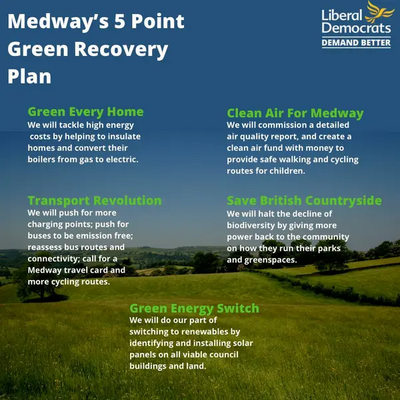'Improving air quality for Medway is at the heart of our environmental policy' - say local Lib Dems

The announcement by 'Friends of the Earth', that Medway suffers with much higher levels of pollution than anywhere else in Kent and the South East, as two of the deadliest air pollutants - nitrogen dioxide (NO2) and particulate matter (PM2.5) - are recorded as being at least double World Health Organisation recommended levels. * FOE findings are from DEFRA data.
The stark reality of dirty air in some of our towns should now be a matter of urgency for Medway Council to put it right, enforcing measures to save our environment and to save lives. Medway's congested A2 corridor urban area still has an air quality management area which runs right through the centre of Medway. This is a huge area in the centre of Medway where people are suffering poor air quality and the Council is clearly dragging its heels.
Medway Liberal Democrats have been consistent in calling on the Council to play a leadership role by adopting policies which are in line with our local environment, and by investing in infrastructure that will improve the air quality and health of Medway residents. The Council's response lacks clarity, considering it had already declared a climate change emergency, admitting that its previous targets were inadequate.
The Council's lack of effective action is appalling, especially when we learn more about the huge health impact of air pollution. Unless there is urgent action in reducing emissions, our town's air quality will worsen and the health of future generations will suffer. We are calling for a better plan that will invest in our local health.
Stuart Bourne, spokesperson for Medway Liberal Democrats said, "It's a scandal that people in Medway live in areas where average air pollution levels are twice World Health Organisation guidelines for either or both of two of the deadliest pollutants. Medway Council should be leading the way in tackling air pollution, and designing a Medway that is better equipped to address these challenges. Findings such as contained in the Friends of the Earth report need to be addressed as rapidly as possible to remedy the situation.
The Council has now got to prioritise its Air Quality Action Plan and action should be taken by the Council to develop an understanding of air quality around our towns' and by reviewing and upgrading its air quality monitoring network to reflect growth and where necessary extending coverage of monitoring to include more potential pollution hotspots around our region.
For more information on our Environmental Policy for Medway, please visit: https://medwaylibdems.org.uk/en/page/5-point-environmental-plan. Medway deserves better, and Liberal Democrats demand better.
ENDS
Additional Notes and Text for Editors:
Nationally, Liberal Democrats are proposing a £20 billion clean air fund that we allow councils to create safe walking and cycle routes for our children, and are calling for World Health Organisation (WHO) guidelines on particulate matter to be adopted into UK law, and met by 2030.
Over the past year, public interest in the environment has increased. According to YouGov's 'Most important issue facing the country' tracker, the percentage of people citing the Environment as the most important issue facing the country has increased from 23% in September 2020 to 33% in September 2021.The World Health Organisation recognise that air pollution is the largest environmental health risk we face today. It causes heart and lung diseases, is linked to low birth weight and children's lung development and may even contribute to mental health issues. Every year, air pollution causes up to 36,000 deaths in the UK.
According to Public Health England, air pollution causes between 28,000 and 36,000 premature deaths a year. The FoE says government targets for cutting the amount of air pollutants by 2040 "must be improved" and should be met by 2030. It also warns the problem could be worse than the study suggested, because the figures are based on the latest available information, from 2020, when lockdown measures meant pollution levels were lower.